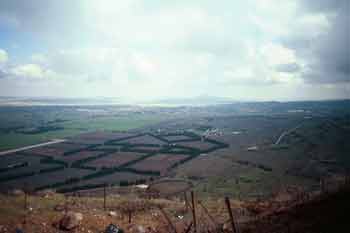And on the seventh day God ended his work which he had made; and he rested on the seventh day from all his work which he had made. And God blessed the seventh day, and sanctified it: because that in it he had rested from all his work which God created and made. Genesis 2:2, 3 God established the sabbath rest at the end of creation week. Moses was given the Ten Commandments, the fourth of which directed Israel to set aside the last day of the week (sabbath) as a day of rest. Exodus 20:10 God later called the sabbath a sign of His covenant with Israel in Exodus 31:13, 17.
To this day, the people of Israel although not predominantly religious, observe Shabbat (sabbath). It is simply a day off to some, but to others it is their time to attend synagogue and worship Jehovah. To one degree or another observance of this day has a major impact on the social life of Israel. Many of the cities virtually shut down on Shabbat which runs from sundown on Friday to sundown on Saturday. Businesses close, buses stop running and the streets largely go quiet. It is all quite interesting to watch.

The people begin preparation for Shabbat on Thursday evening continuing through late Friday afternoon since the markets close before sundown on Friday and will not open again until at least sundown on Saturday. Many of the folks go to the shuk (an open-air market) in downtown Jerusalem. It is one of my favorite places to go and is a sensory experience almost beyond description. The place is packed because the people have to buy their food stuffs and prepare them before sundown on Friday which is the beginning of their sabbath.


There is every conceivable product in the shuk. Here are just a few pictures of the stands found there. You will see an amazing assortment of vegetables. There are avacados the size of a small football....no kidding! There are desserts like the halva you see here for purchase and use at the shabbat meal. There is fresh fish and chicken for the Shabbat meal. There are spices galore and specialty teas and coffees for those with a discerning pallet. There is even a jewelry shop in the midst. You can buy clothing, hats and assorted scarves. The market is just a fun place to be.

My personal favorite in the shuk is the bread. You can see stacks of a variety of breads. The special bread made for Shabbat is called Challah which is a sweet bread. It is woven into loaves about two inches thick, four inches wide and eight inches to twelve inches long. My preference also had raisins included in it. You don't need butter or other additives because Challah is wonderful all by itself. I always manage to obtain at least one loaf during my visits to Jerusalem. I hope your mouth is watering as I describe Challah because I know mine is.
The shuk is also a place of celebration. Here is a street troupe doing a dance presentation for the visitors to the area. It is a time of celebration, but it is also a time of anticipation of the beginning of Shabbat. It is a special time for families to gather and share a meal and stop to rest from a long and busy week. It is an important time.
Sabbath is important to Israel's people and to us as the people of God the Church. Jesus is our sabbath rest and for that we praise our Heavenly Father. Jesus said that sabbath was made for man not the reverse. It is a reminder that we need to take a sabbath rest whether it be Saturday, Sunday or another day of the week. The apostle Paul reminds us in Romans 14:5,
One man esteemeth one day above another: another esteemeth every day alike. Let every man be fully persuaded in his own mind. It is needful and necessary to take a day of rest. We all need time to unwind and recreate. God established the sabbath rest at the very beginning for a reason. Certainly He did not need rest, but He knew and knows that we do.
May He be glorified in our lives as we honor and obey His precepts. Blessings to you in the name of Yeshua Hamashiach.






